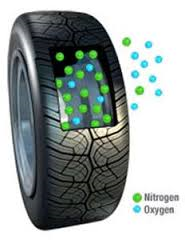Ordinary compressed air has been used to fill car tires in Nigeria ever since the introduction of cars in the country. Although the result has been worthy, do you know that there is a far better alternative to air in filling of vehicle tires? Pure nitrogen has got all the better qualities if used as alternative in filling car tires which includes life span, operations and safety. The uniqueness of Nigerian roads, weather, economy and other factors all point to say that replacing compressed air with pure nitrogen is the future of Nigerian car tires.
Maybe this alternation to Nitrogen in Nigerian car tires will trigger a downward trend in the rate at which road accidents occur. A recent statistics published by the World Health Organization on the ranking of 192 countries concerning deaths caused through road accidents saw Nigeria on the 191 position. This makes Nigeria the second worst hit by road accident fatalities.
Therefore it’s time we began to think outside the box on ways to apply some knowledge on chemistry and technology to better the future of Nigerian cars and roads they ply on. Considering the many physical and chemical properties of Nitrogen, you would agree with me that Nitrogen as a replacement to Air makes a better future for Nigerian car tires.
 |
| IMAGE SOURCE: (southamptonaudi.com) |
Nitrogen Is As Abundant in Nature as Air
You may wonder why this is so. The air you breath already consists of more than 70% Nitrogen with Oxygen making up just about 21% and other gases covering the remaining less than 9%. Therefore the abundance of Nitrogen makes it easily obtainable for use in car tires. The only challenge still remains that the extraction process technology of pure Nitrogen from air remains a bit complex and cost effective.
Nitrogen Withstands Pressure than Air
Among other causes of road accidents in Nigeria is the bad condition of roads, which exerts unfavorable pressure on car tires. Ordinary air is reactive to pressure as it usually heats up and sometimes burst the car tires. Nitrogen is contrastingly unreactive to pressure and even temperature which makes it more suitable for pressure-exerting Nigerian roads. If your car tire filled with Nitrogen remains unaffected despite much pressure from rough roads, don’t you think your safety is better assured and your car’s life span elongated?
Less Deflation of Tires with Nitrogen than Air
Almost every road in Nigeria has got a vulcanizer who pumps air to inflate deflated car tires and this happens unnecessarily very often. With Nitrogen, such problems will cease as molecules of this pure inert gas is bigger in size than molecules of Oxygen in air. Since Nitrogen molecules are bigger than their Oxygen counterparts, it is more difficult for compressed Nitrogen in your car tire to leak either through the tire skin (permeation) or the valves or any other source.
Consequently, loss of compressed Nitrogen gases from car tires through permeation would be rare in occurrence over a period as compared to ordinary air. With Nitrogen as alternative to air, you can save more money usually spent on air top ups or pumping of car tires.
Nitrogen Doesn’t Aid Rusting like Air does
Due to its inert or unreactive nature, Nitrogen is does not encourage rusting or oxidation unlike air does. Compressed air contains oxygen which is the chief oxidizing agent that initiates rusting. Rusting of the metallic lining of car tires simply means formation of iron III Oxide (Fe2O3) on this metals, which is the iron rust you know. This rust shortens the life span, causes wear and tear and mostly results in mechanical failures of the car tire. By using Nitrogen as replacement to the usual air, these problems would be eliminated hence it makes for a better future for Nigerian car tires.
The ultimate question remains; when will the Nigerian scientific research industry develop the technology that can extract pure Nitrogen from air? Surprisingly this technology has been in use in developed countries of the world but its application is costly compared to the conventional compressed air usage. Thus the future is already here, but Nigeria seems to be lagging behind.













